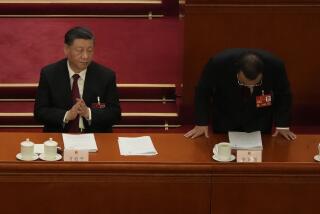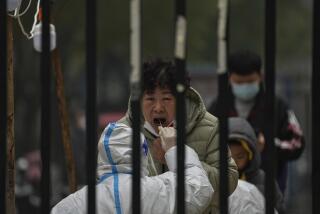Neo-Authoritarianism Won’t Create Economic Miracle
- Share via
The ascension of Shanghai’s Jiang Zemin to the hot seat of Chinese politics represents a victory for advocates of the theory of “neo-authoritarianism.”
Writing in various journals last winter, these theorists argued for the application to China of what they saw was the key to successful economic development in East Asia’s “Four Dragons”--Taiwan, South Korea, Singapore and Hong Kong. In their view, the secret was a strong leader aided by dedicated advisers who could overcome all obstacles to push the economy forward.
This theory appeals to Jiang’s hard-line backers who have justified their crackdown on “hooligans” as necessary to prevent chaos and to do a better job of implementing pro-growth economic policies. They are promoting Jiang as a leader who stimulated economic revival during his stint as Shanghai’s mayor while forcefully dealing with his city’s demonstrators. In other words, a model neo-authoritarian leader.
After already declaring victory in the first stage of ending the anarchy on Tian An Men Square, and then demonstrating their strength by hunting down ringleaders, the neo-authoritarians will next move on to root out what they will define as the obstacles to economic growth, namely corrupt officials and speculating private entrepreneurs. This will appeal to two widespread demands that surfaced repeatedly during the Beijing Spring--eliminating corruption and controlling inflation.
Going after these two categories of villains will replicate the 1951-52 “three-anti and five-anti campaigns,” when the newly victorious Communist regime cracked down on the vices of corruption, waste and bureaucratism among officials, and bribery, tax evasion, theft of state property, cheating on government contracts and stealing of state economic information among private businessmen. At that time, the Communists won tremendous popular support for demonstrating their commitment to running a clean government after the notorious corruption of the Nationalists under Chiang Kai-shek. Restricting the capitalists also was well-received, as it promised to end the crippling inflation as well as links between them and corrupt officials, another holdover from before liberation.
In a new “three-anti and five-anti campaign,” the targets will be mostly mid-level and grass-roots cadres and small entrepreneurs. If any truly big fish are caught, they will be limited to the relatives of the losers in the current power struggle, such as the sons of Zhao Ziyang who are considered quintessential speculators able to extort bribes because of their familial connections. In fact, however, most of those on top in Beijing for the time being are rumored, with much evidence, to be involved directly of indirectly (through their children) in all sorts of corrupt business dealings. They will escape unscathed.
The proponents of neo-authoritarianism in China do not truly understand what makes the Four Dragons tick. A heavy hand alone cannot compel people to produce. The authoritarian leaders in the region created systems where political repression was traded off for genuine opportunities for mobility through education and business, or a safety valve of emigration for the hard-core dissatisfied. As the economies took off, the people began to demand increased democracy. The leaders have dealt with these demands with varying degrees of success.
China’s rulers show no sign of understanding this. The demonstrators complained about the inequality of opportunity in China. The students believed that their careers were determined by connections and corruption, not by merit. Workers and other urbanites said they were being crippled by inflation while their leaders enjoy all sorts of privileges that money can’t buy. Instead of addressing the systemic causes of the recent demonstrations, the leaders blame a tiny handful of troublemakers, foreign meddling and insufficient attention to ideological indoctrination.
Selecting a new Communist Party general secretary who acts authoritatively, wears tailored suits and over-sized glasses, speaks English and can eat with a knife and fork is not enough to assuage the fears of foreign investors, to say nothing of the profound malaise of the Chinese masses. If, instead of taking effective action to solve China’s problems, the leaders swallow their own propaganda and believe that authoritarian methods alone will keep them in power, then they will face renewed popular outbreaks in the near future.
More to Read
Sign up for Essential California
The most important California stories and recommendations in your inbox every morning.
You may occasionally receive promotional content from the Los Angeles Times.










